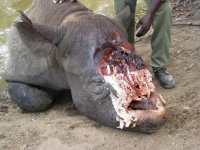News
Latest Lion Aid News
Rhino horns confiscated in the Philippines
Monday 10th September 2012
 Thanks to alert Customs agents in Manila, an illegal shipment of rhino horns was intercepted in the Phillipines. The horns were hidden in sacks of cashew nuts sent from Mozambique….
We do hope that South African authorities will pay attention to this shipment via Mozambique, but we continue to despair at their level of effective attention to the ever-increasing levels of rhino poaching since 2009. Four years have gone by since South Africa was alerted to a massive increase in rhino killings. 2012 will be a record year given that about 2 rhinos are poached per day. Where is South Africa’s will and determination to put an end to this? Certainly not in the area of prosecution of those charged with poaching – cases seem endlessly delayed and trial dates continually postponed. Apparently South Africa has had high-level discussions with Vietnam to address the illegal trade and Vietnamese citizens are now no longer allowed to conduct “pseudo” trophy hunts for rhinos (as if the cartels are not able to recruit other country nationals), but why does South Africa still allow the legal export of horns, live animals, bones, bodies etc to countries like China, Vietnam and Thailand? Why does South Africa allow a live trade to “zoos” in China and Vietnam who clearly state they have their own pharmaceutical companies and the rhinos all go missing soon after arrival? CITES has stated they want Vietnam to now account for the 241 trophy horns sent from South Africa 2003-2010 – trophies are prohibited to be used for commercial purposes (though by definition trophy hunting is a commercial enterprise). Vietnam will never be able to produce those trophy horns, and CITES has no teeth. So what is the solution to the greatest outbreak of commercial poaching in the recent history of South Africa? Obviously better law enforcement, diligent prosecution and jail sentences that constitute a real deterrent. No more legal sales of rhino horns, bodies, parts, and “pseudo” trophy hunting. A realization that providing a supply stimulates a demand that will inevitably be met by illegal means. Complete negation of calls by those with vested interests to legalize private horn sales – and an acknowledgement that there is a relationship between cause and effect – the poaching went viral after South Africa allowed legal trade in rhino horns in the first place. Much better international wildlife crime investigation to shut down the exporters and importers – not that difficult as it is a crime committed in broad daylight right now. And perhaps less reluctance by South Africa to allow exposure of those in high positions deeply involved in profit-taking from illegal activities? Picture credit: http://www.environmentafrica.org/current-projects/wepu/ Tags: CITES, South Africa, China, poaching, Mozambique, Vietnam, Thailand, Manila, rhino horns, Philippines, Categories: Illegal Wildlife Trade |
Posted by Pieter Kat at 11:21
No comments have been posted yet.
Add a new comment
Existing user
New user sign up



